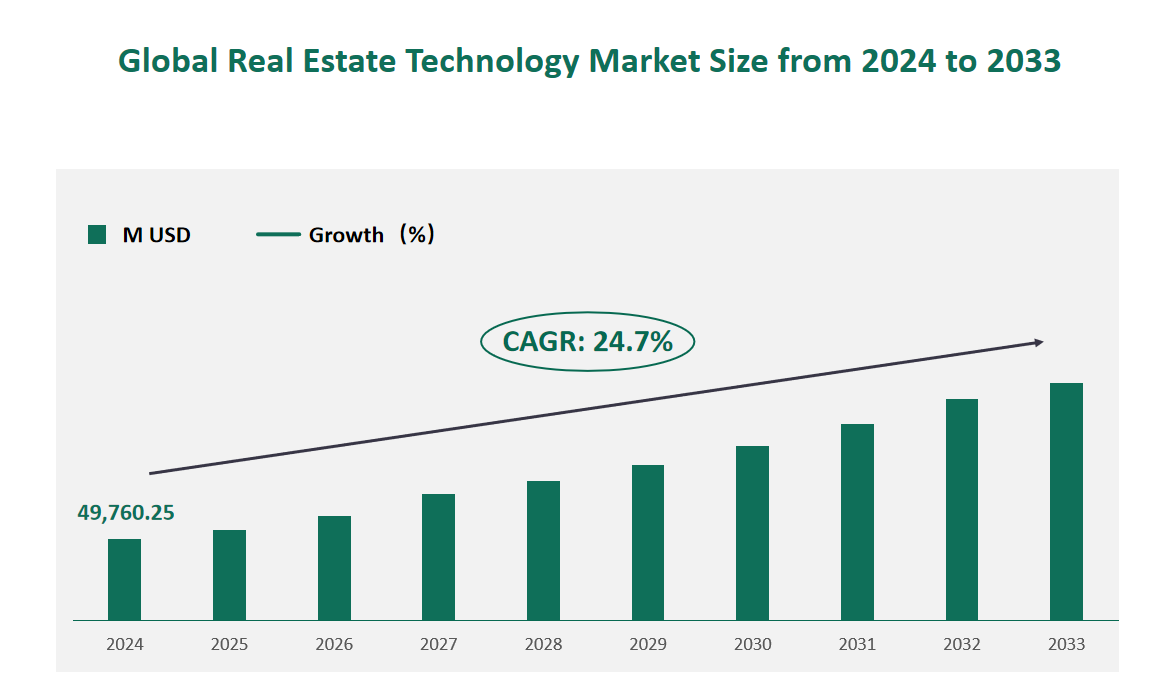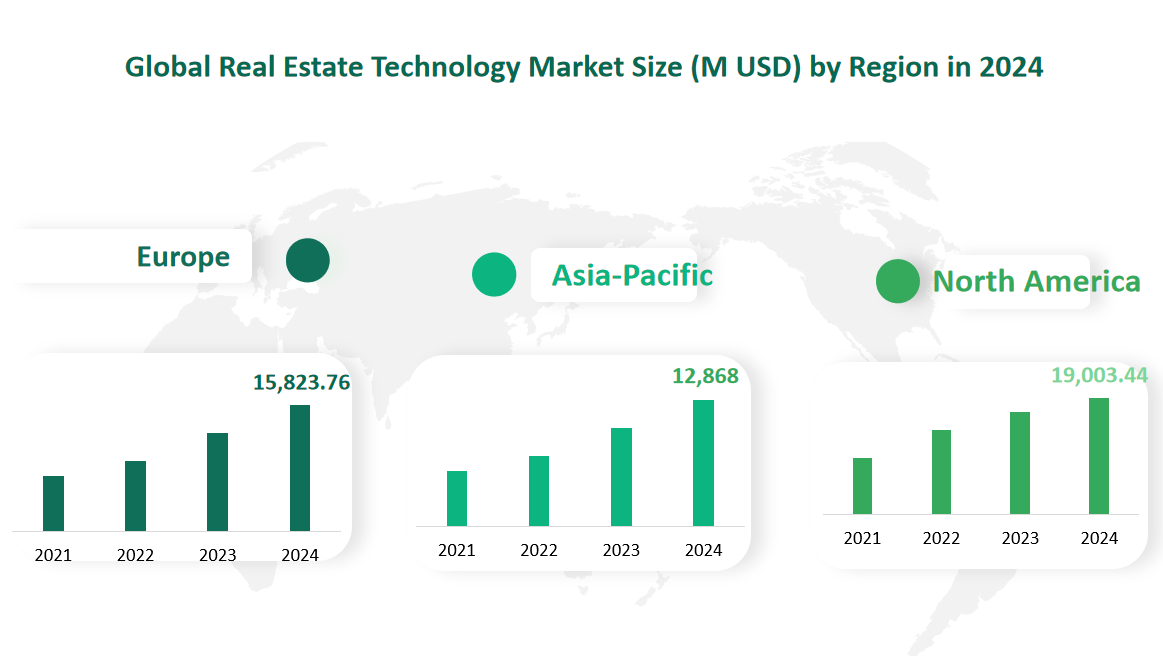1 Global Real Estate Technology Market Size (Value) and CAGR (2024-2033)
In 2024, the global Real Estate Technology market was valued at USD 49,760.25 million, with a CAGR of 24.7% from 2024 to 2033.
Real Estate Technology, often referred to as RealTech, encompasses a wide range of technological innovations that transform the way real estate transactions are conducted. This includes software solutions, augmented reality/virtual reality (AR/VR) applications, Internet of Things (IoT) devices, artificial intelligence (AI), and other related technologies. These tools are designed to streamline processes, enhance user experiences, and improve the efficiency of real estate operations. RealTech is not only limited to residential properties but also extends to commercial real estate, making it a versatile and dynamic industry.
Figure Global Real Estate Technology Market Size (M USD) and CAGR 2024-2033

2 Real Estate Technology Market Drivers
Growing Urbanization Rate
One of the primary driving factors is the increasing urbanization rate. According to the United Nations’ 2014 World Urbanization Prospects Report, 54% of the global population currently lives in urban areas, and this number is projected to reach 70% by 2050. The Asia-Pacific region and Eastern Europe are expected to see even higher urbanization rates, close to 85%. This massive population shift is creating significant demand for housing and infrastructure, driving the need for innovative real estate solutions. RealTech plays a crucial role in addressing these challenges by providing efficient and sustainable solutions for urban development.
Improved Mobile Technology
The rapid advancement in mobile technology has also been a significant driver for RealTech. The widespread adoption of smartphones and the increasing penetration of mobile internet have changed the way consumers interact with real estate services. Mobile applications and platforms now offer users the ability to search for properties, schedule tours, and even complete transactions on their mobile devices. This convenience and accessibility have led to a higher adoption rate of RealTech solutions among consumers and real estate professionals alike.
Millennials’ Preference for New Tech
Millennials are becoming a dominant force in the labor market, and they bring with them a preference for technology-driven solutions. According to the Brookings Institution, by 2025, 75% of the labor force will be millennials. This demographic group is highly comfortable with technology and expects seamless digital experiences in all aspects of their lives, including real estate. RealTech solutions such as virtual tours, AI-driven property recommendations, and digital transactions align perfectly with millennials’ preferences, driving the adoption of these technologies in the industry.
3 Real Estate Technology Market Challenges
Integration of New Technology with Traditional Real Estate Organizations
One of the primary challenges is the integration of cutting-edge technologies into traditional real estate organizations. These organizations often have long approval and development cycles, making it difficult to adopt new technologies quickly. Additionally, there is a risk of investing in technologies that may become obsolete or fail to deliver the expected returns. This uncertainty can lead to hesitation and resistance from traditional real estate companies, slowing down the adoption of RealTech solutions.
Inaccurate Data and Reliability Issues
Real estate technology platforms often rely on data collected from various sources, including public records and user inputs. However, this data can be inaccurate or outdated, leading to unreliable property valuations and listings. For example, online estimates may not accurately reflect the current market value of a property, causing confusion and mistrust among users. This issue is particularly prevalent in platforms that provide property valuations and market trends, where accuracy is crucial for decision-making.
Cultural and Operational Barriers
The real estate industry has long-established methods and practices that are deeply ingrained in its operations. Introducing new technologies often requires significant changes in workflow and mindset, which can be met with resistance from employees and management. The cultural shift towards embracing technology can be slow, especially in organizations that prioritize traditional methods over innovation. This resistance can hinder the widespread adoption of RealTech solutions.
4 Global Real Estate Technology Market Size by Type in 2024
Software solutions form a crucial part of the RealTech market, offering tools for property management, transaction processing, and customer relationship management. In 2024, the software segment is expected to reach a value of $19,277.12 million. This includes platforms that streamline real estate operations, enhance user experiences, and provide data-driven insights to stakeholders. The growth in this segment is driven by the increasing demand for efficient and user-friendly software solutions that can manage complex real estate processes.
Augmented Reality (AR) and Virtual Reality (VR) technologies are transforming the way real estate is marketed and experienced. These technologies enable immersive virtual tours, allowing potential buyers to explore properties from anywhere in the world. In 2024, the AR/VR segment is projected to reach $7,847.19 million. This growth is attributed to the rising adoption of these technologies by real estate agents and developers to enhance customer engagement and provide a more interactive experience.
The Internet of Things (IoT) is another significant segment in the RealTech market, with applications ranging from smart home systems to property management solutions. IoT devices can monitor and control various aspects of a property, enhancing security, energy efficiency, and overall management. In 2024, the IoT segment is expected to be valued at $11,619.02 million. The growth in this segment is driven by the increasing demand for smart and connected real estate solutions that improve operational efficiency and user convenience.
Artificial Intelligence (AI) is playing an increasingly important role in the RealTech market, with applications in property valuation, customer service, and predictive analytics. AI-powered platforms can analyze vast amounts of data to provide accurate property valuations, personalized recommendations, and predictive insights. In 2024, the AI segment is projected to reach $6,832.08 million. The growth in this segment is driven by the increasing adoption of AI technologies to enhance decision-making and improve user experiences.
Table Global Real Estate Technology Market Size by Type in 2024
Type | Market Size (M USD) 2024 |
Software | 19277.12 |
AR/VR technology | 7847.19 |
IoT | 11619.02 |
AI | 6832.08 |
Others | 4184.84 |
5 Global Real Estate Technology Market Size by Application in 2024
Residential real estate technology focuses on tools and platforms designed to streamline the buying, selling, renting, and management of residential properties. This includes single-family homes, apartments, condos, and other residential units. In 2024, the residential application segment is expected to reach a value of $33,993.9 million. This segment is driven by the increasing demand for user-friendly platforms that offer virtual tours, property management software, and AI-driven property recommendations. The growth in this segment is also supported by the rising adoption of smart home technologies and mobile applications that enhance the overall user experience.
Commercial real estate technology encompasses solutions for office buildings, retail spaces, industrial properties, and other commercial units. This segment includes platforms for property management, leasing, and transaction processing, as well as tools for market analysis and investment management. In 2024, the commercial application segment is projected to reach $15,766.35 million. The growth in this segment is driven by the increasing need for efficient and data-driven solutions that can manage complex commercial real estate operations. The adoption of AI and IoT technologies for optimizing property performance and tenant engagement is also a significant factor in this segment’s growth.
Table Global Real Estate Technology Market Size by Application in 2024
Application | Market Size (M USD) 2024 |
Residential | 33993.90 |
Commercial | 15766.35 |
6 Global Real Estate Technology Market Size by Region in 2024
North America is expected to maintain its dominant position in the RealTech market, driven by technological advancements and a strong consumer preference for digital solutions. In 2024, the market value in North America is projected to reach $19,003.44 million. The region’s growth is supported by a robust technology infrastructure, high adoption rates of AI and IoT, and a strong focus on innovation.
Europe is another significant contributor to the RealTech market, with a projected value of $15,823.76 million in 2024. The region’s growth is driven by increasing investment in smart city initiatives, the adoption of digital platforms for property management, and a growing demand for sustainable real estate solutions. Europe’s strong regulatory environment and focus on data privacy also play a crucial role in shaping the market.
The Asia-Pacific region is experiencing rapid growth in the RealTech market, driven by urbanization, technological advancements, and increasing investment in real estate technology. In 2024, the market value in Asia-Pacific is projected to reach $12,868.00 million. China and India are leading the growth in this region, with significant contributions from Japan, South Korea, and Australia. The region’s growth is also supported by government initiatives to promote smart cities and digital infrastructure.
Figure Global Real Estate Technology Market Size by Region in 2024

7 Major Players in Global Real Estate Technology Market
7.1 Opendoor
Company Profile: Headquartered in San Francisco, Opendoor is a leading digital platform for residential real estate.
Business Overview: Since 2014, Opendoor has been revolutionizing the home – buying and selling process. It has rebuilt the consumer real estate experience, enabling transactions on mobile devices.
Product/Solution Introduction: Opendoor allows homebuyers to schedule in – person or virtual tours of homes on demand. They can even self – tour Opendoor – owned homes using the app. Additionally, users can access on – demand expert support from licensed professionals through the app.
In 2020, Opendoor’s value was 1239.67 million US dollars, with a gross of 504.70 million US dollars and a gross margin of 40.71%.
7.2 Airbnb
Company Profile: Airbnb, Inc. operates an online marketplace for travel information and booking services.
Business Overview: It offers lodging, home – stay, and tourism services via websites and mobile applications, connecting hosts with travelers globally.
Product/Solution Introduction: Airbnb provides a cloud – based property management software called Hosty, which has native Airbnb API integration. It helps property managers handle multiple Airbnb accounts and listings, including tasks like guest communication, reservation management, and review writing.
In 2020, Airbnb’s value was 1103.05 million US dollars, with a gross of 420.57 million US dollars and a gross margin of 38.13%.
Product Description:
The TopMap Micro.View+ is the next-generation optical surface profiler, designed for modularity and customization. It delivers detailed analysis of surface roughness, texture, and microstructure topography, with a high-resolution 5 MP camera for incredible 3D data visualization. The TopMap Pro.Surf+ is an all-in-one instrument that combines surface roughness and form deviation measurement in a single system, ideal for measuring precision surfaces in metrology laboratories and production lines.
Recent Financial Data:
In 2020, Polytec GmbH reported a revenue of $24.89 million, with a gross margin of 47.12%.
7.3 Lianjia
Company Profile: Lianjia is the largest real estate brokerage firm in China.
Business Overview: With over 6,000 branches and 120,000 employees nationwide in China, it offers a wide range of real – estate – related services, including buying, selling, and renting properties both domestically and internationally. It is also building an O2O platform to enhance the efficiency of real estate professionals.
Product/Solution Introduction: Lianjia utilizes big data analysis. It creates user portraits based on transaction, watch, search, and click data, and then provides intelligent housing recommendations and suggests suitable brokers. It also predicts housing price trends and evaluates housing competitiveness.
In 2020, Lianjia’s value was 1020.36 million US dollars, with a gross of 428.76 million US dollars and a gross margin of 42.02%.

